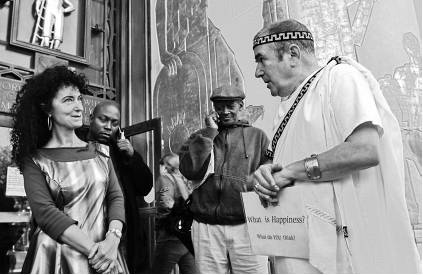New Yorkers are by nature independent-minded. So it’s right that the biennial conference of the National Coalition of Independent Scholars is being held this weekend in Midtown.
Participants range from a historian of debt peonage to a Jungian psychologist studying medieval fiction. What they share is the pursuit of academic research without salaried university positions.
William Manchester, Robert Massie, and Barbara Tuchman are among those who have forged scholarly careers outside the academy. They found the freedom to pursue topics that do not neatly fit accepted boundaries.
“You have freedom to follow your own bliss without regard to fashions and trends,”said Ronald Gross,an independent scholar. “You can pick up any subject,and nobody is going to say ‘no,’” said Odeda Rosenthal, who has written a reference book on colorblindness.
Working from home offers advantages such as the freedom from papers to grade or departmental meetings to attend.The drawbacks tend to be financial. “To me, there’s nothing like a regular income,” said sociologist Nathan Glazer, who has taught at Berkeley and Harvard.
Many independent scholars have day jobs or hold down several small jobs to sustain themselves. Julia Ballerini, who researches 19th-century travel photography, speaks of “supporting my habit.”
A chief obstacle independent scholars face is access to libraries.The coalition’s president, Georgia Wright, says she cannot use interlibrary loan without relying on her husband’s university affiliation. Another scholar from Canada lives in a recreational vehicle and emails another NCIS member who faxes library materials to him.
Other hurdles include getting the requisite letters of recommendation for grants and fellowships. “It’s middle-level scholars in academe who tend to look down on independent scholars. I recommend that they go to absolutely top people” for assistance, said Mr. Gross.They can afford to evaluate work on its merit, even if from an intriguingly unorthodox angle, he said. “Good scholarship is good scholarship, wherever it comes from,” said Janet Wasserman, a specialist in Franz Schubert.
Karen Reeds of Princeton, N.J., said independent scholars have to work considerably harder to get an editor at a university press to look at a book proposal.
There is a sense that academia is getting more used to independents. The Modern Language Association has begun welcoming them on committees.
Ms.Wright believes the independent scholarship has matured: “We’re no longer crying about not getting into libraries, people are talking about what they’re doing. There is more acceptance now than even 10 years ago.”
Still it is hard to completely define an independent scholar. Ms. Wright points out that some “think you should admit anyone creative. If you’re just reading, you’re not a scholar; you’re a thinker.There are these little schisms.”
Ms. Ballerini said a lot of people are ashamed of being independent scholars: “They will put down any remote affiliation they have, such as where they may be teaching one course. I believe it’s time for the label independent scholar to be worn with pride.”
At one conference, poetry scholar Charlotte Mandel wrote down “independent scholar” and was introduced as “unaffiliated.” “I complained about that. I feel very much affiliated to my work,my family” and others, she said.
The nonhierarchical spirit of the coalition is captured by their organizational directory, which lists a scholar’s interest areas, without mentioning any educational degrees. What you research is what matters, not your title.
The interests of independent scholars are mesmerizingly far-flung.
Ms. Reeds is attempting to start a museum in New Jersey at the site of the former village of epileptics.
Ms. Wright is a medieval art historian who co-directs the Limestone Sculpture Provenance Project, which uses neutron activation analysis to figure out where pieces of medieval sculptures in museums come from.
Ms. Rosenthal ran a guesthouse in East Hampton and happened on the subject of cosmogony when someone whose house portrait she was painting suggested she contact her sister-in-law. She was also talked into writing a book about the Jews of New Zealand by a woman she met at a bus stop.
Ralph Dumain, who studied linguistics and library science, runs a Web site about autodidacts. He studies the work of Caribbean-born intellectual C.L.R. James, whose work he discovered accidentally while “hanging around the university of Buffalo library, looking through the new book section.” Mr. Dumain has translated James into Esperanto.
Robert Kanigel, who actually now teaches science writing at M.I.T., researches natural and synthetic leather, a pursuit which has lead him to a vinyl factory in Sandusky, Ohio, as well as a meetings of the American Leather Chemists Association.
Ms. Rosenthal sums up the lure of the academic independence this way: “I have added to the font of knowledge and have had a good time.”
Just who are members? More independent scholars work in the humanities, since science is too expensive to pursue on one’s own. Mr. Gross said a notable exception is astronomy, a field where amateurs have played a vital role.
A majority of current NCIS members are female: “Women finally got into academe at just the wrong point in the 1960s and mid-1970s and many got sidelined.”The baby boom burst at that point, Ms. Wright said.
When the academic market contracts, the numbers of independent scholars tend to increase.
Independent scholars, Ms. Wright said, can be found in any area with good universities. Faculty spouses are one source of members; another is emeriti faculty who have left academia and need a support group, she said. Members tend to be scattered along both coasts.
Clusters of independent scholars exist in San Diego, San Francisco, North Carolina’s Research Triangle, Princeton, Minnesota, Washington, D.C., and New Haven, Conn. New York used to have an organized group, but it does have the university seminars at Columbia. “Chicago is a great disappointment,” said Ms. Wright. “One of the problems is that independent scholars are so damned independent. It’s like herding cats.”

SOCRATIC METHOD Ronald Gross as Socrates at the Brooklyn Public Library. YOLA MONAKHOV